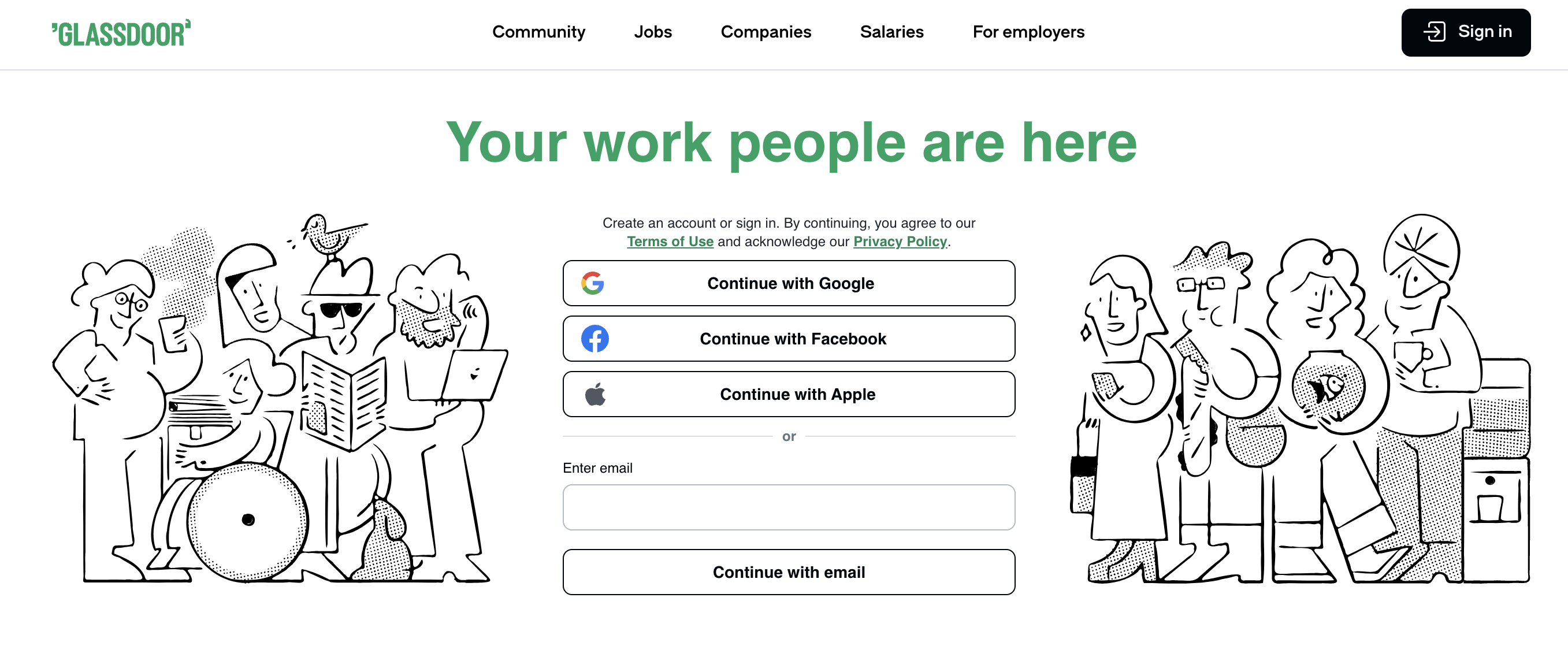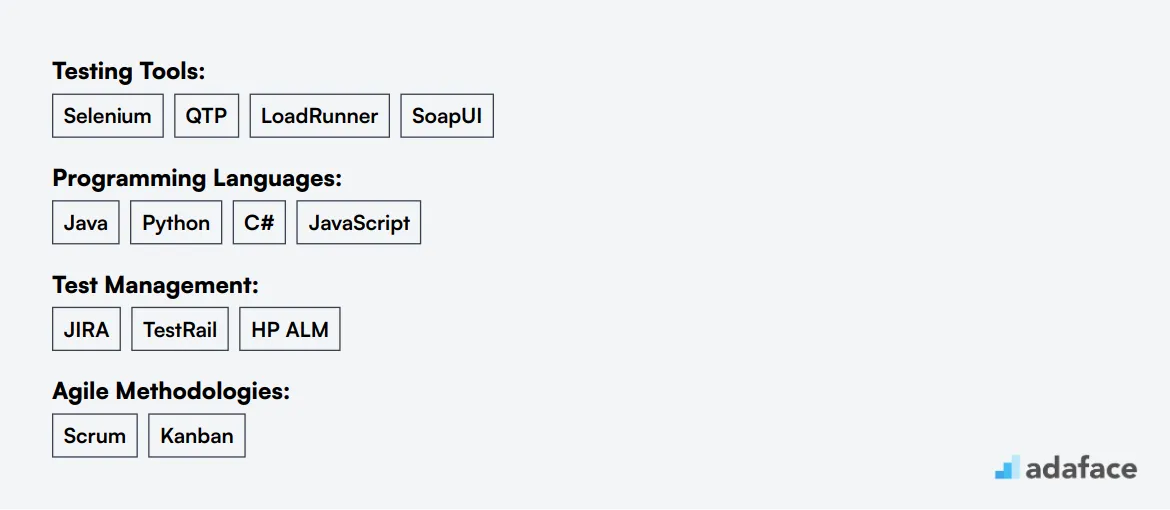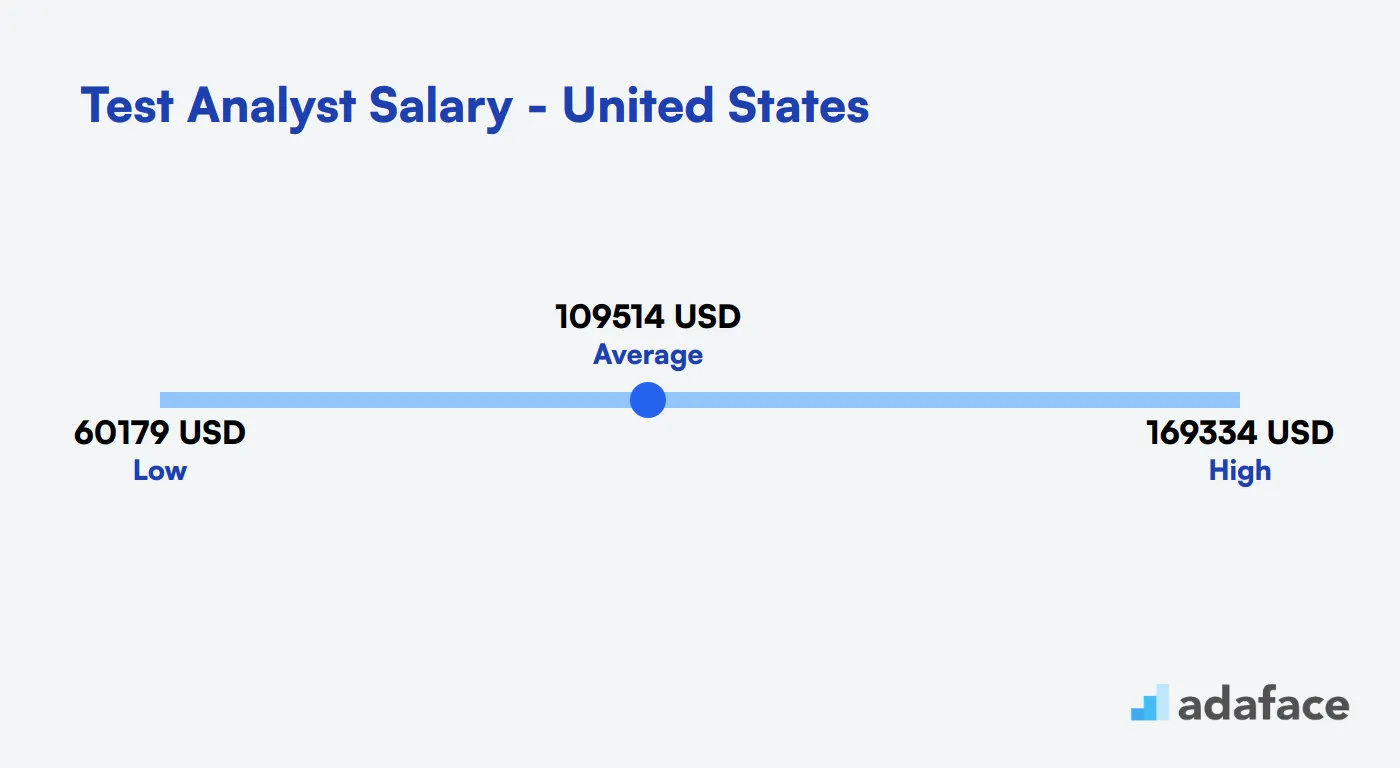In today's fast-paced software development environment, hiring a proficient Test Analyst is more important than ever. They play a crucial role in ensuring the quality and functionality of your software products, which directly impacts customer satisfaction and business success. However, many companies struggle to identify the right candidate due to a lack of understanding of the role's unique skill set and varying responsibilities. Common pitfalls include underestimating the importance of specific technical skills or overlooking the need for strong analytical and problem-solving abilities.
This guide provides a comprehensive overview of what makes a successful Test Analyst, from the key skills and qualifications to look for, to the best hiring practices. We also cover how to effectively screen candidates using tailored assessments and interview techniques. For more resources on assessment tests, explore our platform here.
Table of contents
Key Skills and Qualifications for a Test Analyst
When hiring a Test Analyst, defining the candidate profile can be challenging. Recruiters often confuse required skills with preferred ones, which may lead to overlooking suitable candidates. It’s essential to differentiate between what is necessary for the role and what would be nice to have.
Here are the required and preferred skills and qualifications to consider when evaluating candidates:
| Required skills and qualifications | Preferred skills and qualifications |
|---|---|
| Bachelor’s degree in computer science, information systems, or related field | ISTQB certification or equivalent |
| Experience in software testing and QA methodologies | Experience with performance and/or security testing |
| Strong knowledge of test automation tools | Knowledge of programming languages like Java, C#, or Python |
| Familiarity with Agile frameworks and regression testing | Experience in continuous integration/continuous deployment (CI/CD) |
| Excellent analytical and problem-solving skills | Proficiency in test management software (e.g., JIRA, TestRail) |
How to Write a Test Analyst Job Description
Crafting a precise Test Analyst job description is a key step in attracting the right candidates. Once you have a candidate profile ready, it's time to capture that in the job description to engage potential candidates.
- Highlight key responsibilities and impact: Clearly specify the Test Analyst's primary duties, such as designing test cases, executing tests, and collaborating with development teams to improve product quality. Make sure to convey how their work contributes to the organization's success.
- Balance technical skills with certifications and soft skills: While listing skills like familiarity with testing tools such as Selenium and JIRA, don't forget to mention certifications like ISTQB and soft skills such as analytical thinking and communication. A well-rounded list ensures you attract candidates with diverse capabilities.
- Showcase your company's unique selling points: Stand out by emphasizing what makes your company and the Test Analyst role special. Whether it's innovative projects, career advancement opportunities, or a collaborative work environment, these details can be compelling. For a more detailed view of the Test Analyst job description, ensure your listing captures these elements effectively.
Best Platforms to Hire Test Analysts
Once the job description is ready, it's time to list your Test Analyst job openings on prominent platforms to connect with potential candidates. These platforms provide access to a diverse talent pool, making it easier to find professionals with the specific skills and experience you need.
LinkedIn Jobs
Ideal for finding full-time Test Analysts. Offers a large pool of professional candidates and allows for detailed job postings with specific requirements.

Indeed
Versatile platform suitable for posting full-time, part-time, and contract Test Analyst positions. Reaches a wide audience of job seekers across various experience levels.

Glassdoor Jobs
Excellent for corporate Test Analyst roles. Provides company reviews and salary information, attracting candidates who value company culture and transparency.

Apart from the top platforms like LinkedIn Jobs, Indeed, and Glassdoor Jobs, there are several other great options for hiring Test Analysts. Consider using Dice for tech-focused roles, Upwork for freelance positions, and AngelList Jobs if you are a startup. Platforms like ZipRecruiter use AI-powered matching to streamline your hiring process, while Monster offers a broad range of candidates. For those looking for remote roles, FlexJobs is a great choice, and Toptal provides access to elite, pre-vetted freelancers. For more insights on how to choose the right platform for your needs, check this online assessment platform.
How to Screen Test Analyst Resumes
Resume screening is the first crucial step in narrowing down candidates for a Test Analyst position. This process helps sift through a large pool of applicants and identify those with the right skills and experience needed for the role. By doing this, hiring managers can focus their efforts on interviewing only the most promising candidates.

Start by manually screening resumes for key keywords that align with the Test Analyst role. Look for mentions of testing tools like Selenium or QTP, strong programming skills in languages such as Java or Python, and experience with test management software like JIRA or TestRail. These keywords can help you quickly identify candidates who have the technical proficiency necessary for the position.
To streamline the process, consider using AI-based tools or language models to assist with resume screening. Tools like ChatGPT can help by flagging resumes that contain the relevant keywords and scoring them based on how well they match the job description. Such tools can save time and increase the effectiveness of your initial screening process.
For example, you might use a prompt like this when utilizing AI:
TASK: Screen resumes to match job description for Test Analyst role
INPUT: Resumes
OUTPUT: For each resume, provide the following information:
- Email id
- Name
- Matching keywords
- Score (out of 10 based on keywords matched)
- Recommendation (detailed recommendation of whether to shortlist this candidate or not)
- Shortlist (Yes, No or Maybe)
RULES:
- If you are unsure about a candidate's fit, put the candidate as Maybe instead of No
- Keep recommendation crisp and to the point.
KEYWORDS DATA:
- Testing Tools (Selenium, QTP)
- Programming Languages (Java, Python, C#)
- Test Management (JIRA, TestRail)
- Agile Methodologies (Scrum, Kanban)
This approach can greatly enhance your ability to filter candidates efficiently and focus on those who truly stand out.
Which skills tests should you use to assess Test Analysts?
Using skills tests to evaluate potential Test Analysts ensures you accurately gauge their abilities, beyond what's stated on their resumes. This approach provides a reliable measure of their actual competencies. Here are some recommended tests to help you make informed hiring decisions.
QA Engineer Test: Assess your candidates' knowledge of quality assurance principles and methodologies with the QA Engineer Test. It's ideal for identifying those who understand the intricacies of the QA process.
Attention to Detail Test: Test Analysts must have a sharp eye for detail. The Attention to Detail Test helps determine whether candidates can spot errors and maintain high standards in their work.
Problem-Solving Test: Evaluating a candidate’s analytical and logical abilities is crucial. The Problem-Solving Test is designed to reveal how candidates approach and solve complex issues.
Manual Testing Online Test: Validate your candidates' manual testing skills with the Manual Testing Online Test. This test is perfect for ensuring they can perform tasks that require meticulous manual verification.
Selenium Online Test: For roles requiring automation expertise, the Selenium Online Test is a great choice. It helps confirm whether candidates can effectively use Selenium for test automation.
Recommended Case Study Assignments to Screen Test Analysts
Case study assignments can be a valuable tool in hiring Test Analysts as they provide real-world scenarios to assess candidates' skills and problem-solving abilities. However, they come with challenges such as being lengthy, leading to lower completion rates, and potentially losing out on good candidates who may not want to invest the time. Here are some sample case studies that can help strike the right balance.
Functional Testing Analysis: This case study requires candidates to evaluate a software application to identify functional bugs. It is recommended because it allows you to assess how well a candidate can analyze requirements and create effective test cases. See more about functional testing interview questions to understand what to look for.
Performance Test Scenario: Candidates are tasked with designing a performance test strategy for a web application. This assignment is beneficial as it highlights their ability to handle scenarios related to performance bottlenecks and resource allocation, which are common in real-world applications.
Bug Prioritization Task: In this case study, candidates must prioritize a list of bugs based on severity and impact on the software. This is insightful for understanding their decision-making process and ability to prioritize issues. Learn more about the skills required for a Test Analyst to see why this is important.
How to Structure Technical Interviews for Test Analysts
After candidates pass the initial skills tests, it's time for technical interviews to assess their hard skills in-depth. While skills tests are great for initial screening, technical interviews help identify the best-fit candidates for the Test Analyst role. Let's explore some key questions to ask during these interviews.
Consider asking: 'Can you explain the difference between black-box and white-box testing?', 'How do you approach test case prioritization?', 'What strategies do you use for API testing?', 'How do you handle test data management?', and 'Can you describe a challenging bug you've encountered and how you solved it?'. These questions help evaluate the candidate's testing knowledge, problem-solving skills, and real-world experience in quality assurance.
How much does it cost to hire a Test Analyst?
Hiring a Test Analyst can vary significantly depending on the location and level of experience. In the United States, the average salary is about $109,515 annually, with a range stretching from $60,179 to $169,335. In Australia, salaries average around AUD 103,982, ranging from AUD 52,547 to AUD 187,070. These figures highlight the importance of considering geographical location when budgeting for this role.
Test Analyst Salary in the United States
The average salary for a Test Analyst in the United States is approximately $109,515 per year. Salaries can range from around $60,179 at the lower end to about $169,335 for those with more experience or in specialized roles. It's important to consider location as salaries can vary significantly across different states.

Test Analyst Salary Australia
In Australia, the average salary for a Test Analyst is around AUD 103,982. Across various cities, salaries can range significantly, from as low as AUD 52,547 in Newcastle, NSW, to as high as AUD 187,070 in Canberra, ACT. Major cities like Sydney and Melbourne generally offer salaries between AUD 69,569 and AUD 139,530. The median salary across the country stands at approximately AUD 100,661.

What's the difference between a Manual Test Analyst and an Automation Test Analyst?
People often confuse Manual Test Analysts and Automation Test Analysts, thinking they're just parts of the same testing team. However, these roles have distinct focuses and require different skill sets in the software development lifecycle.
A Manual Test Analyst centers their work around manual testing. They engage in exploratory testing and rely on basic technical skills, using test management tools to ensure quality. This role is slower in test execution, offering stronger exploratory testing capabilities, but it tends to result in higher long-term costs due to the need for continuous human involvement.
On the other hand, an Automation Test Analyst specializes in automated testing, requiring advanced technical skills and familiarity with programming languages like Python, Java, or JavaScript. They utilize automation frameworks such as Selenium or Cypress, achieving faster test execution and greater scalability. This role typically results in lower long-term costs, as automated tests can be reused without continuous manual input.
| Manual Test Analyst | Automation Test Analyst | |
|---|---|---|
| Primary Focus | Manual testing | Automated testing |
| Technical Skills | Basic | Advanced |
| Programming Languages | Limited or none | Python, Java, JavaScript |
| Tools | Test management tools | Automation frameworks (Selenium, Cypress) |
| Test Execution Speed | Slower | Faster |
| Scalability | Limited | High |
| Cost Efficiency | Higher long-term cost | Lower long-term cost |
| Exploratory Testing | Strong | Limited |
What are the ranks of Test Analysts?
Test analysts play a crucial role in ensuring the quality and functionality of software products. However, it's common to confuse their roles and responsibilities with other testing positions. Understanding the hierarchy within test analysts can help in making informed hiring decisions.
Junior Test Analyst: This entry-level position typically involves executing test cases and documenting software defects. Junior test analysts work under the guidance of senior team members to learn about testing processes and tools.
Test Analyst: At this level, professionals have gained experience in creating and executing test plans and cases. They are responsible for identifying bugs and ensuring product quality. Test analysts work more independently and often collaborate with developers to understand project requirements.
Senior Test Analyst: With several years of experience, senior test analysts lead testing projects and mentor junior colleagues. They design complex test scenarios, suggest improvements in the testing process, and often interact directly with stakeholders to ensure testing aligns with business goals.
For more detailed job descriptions for Test Analysts and other roles, you can refer to the Test Analyst Job Description.
Hire the Best Test Analysts for Your Team
We've covered the key skills, qualifications, and steps to hire top Test Analysts. From crafting detailed job descriptions to screening resumes, conducting technical interviews, and using skill assessments, each step plays a role in finding the right fit for your team.
If there's one key takeaway, it's the importance of using accurate job descriptions and skills tests to make your hiring process more effective. Consider using a QA Engineer Test to evaluate candidates objectively and ensure they have the necessary skills for the role.
QA Engineer Test
FAQs
A Test Analyst should have strong analytical abilities, attention to detail, and excellent problem-solving skills. Technical skills such as knowledge of test automation tools and familiarity with software testing methodologies are also important.
An effective job description should clearly outline the role's responsibilities, required qualifications, and desired skills. Highlight specific tools or methodologies the candidate should be familiar with, and emphasize the importance of analytical and communication skills.
You can find Test Analysts through online job boards, professional networking sites like LinkedIn, and specialized recruitment agencies. Consider using platforms that cater specifically to software testing professionals.
A technical interview for a Test Analyst should assess the candidate's knowledge of testing methodologies, their ability to create test plans, and their proficiency with testing tools. Including a practical problem-solving exercise can also be beneficial.
When evaluating resumes, look for a strong background in software testing, relevant technical certifications, and evidence of experience with specific testing tools and methodologies. Pay attention to how candidates describe their problem-solving experiences and contributions to previous projects.
A Manual Test Analyst focuses on manually testing software for defects, ensuring functionality and usability. An Automation Test Analyst, on the other hand, develops automated tests to increase efficiency and cover more test cases. Both roles require distinct skill sets and tools.
Assessment tests such as logical reasoning, problem-solving, and specific software testing tools like Selenium can help evaluate a Test Analyst's capabilities. Explore our test offerings here for more information.

40 min skill tests.
No trick questions.
Accurate shortlisting.
We make it easy for you to find the best candidates in your pipeline with a 40 min skills test.
Try for freeRelated posts
Free resources



